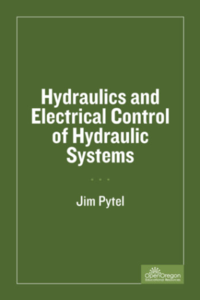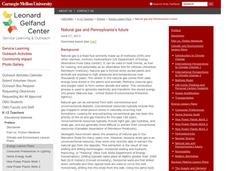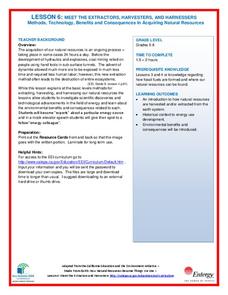Open Oregon Educational Resources
Hydraulics and Electrical Control of Hydraulic Systems
It's all systems go for learning about hydraulic systems. An eBook provides a set of videos and exercise questions for a semester-long course on hydraulics. Six units introduce hydraulics, Pascal's law, hydraulic applications, flow...
Institute of Electrical and Electronics Engineers
Water Fountain
Thorough instructions are given to guide you through making a demonstration hydraulic pump from two plastic soda bottles. After using the resource to teach your class about Pascal's and Bernoulli's principles, turn them loose in groups...
Curated OER
Hydraulic Mining
Pupils explore reasons for supporting and opposing hydraulic mining. It was the most efficient and used mining method until 1884. A simulated court hearing is held where a decision is made whether to allow the continued use of this...
Curated OER
Hydraulics and Pneumatics
Seventh graders participate in an experiment using syringes. In this physics lesson students demonstrate the movement and principles of pneumatics and hydraulics.
Curated OER
Fracking: Positive or Negative Impact?
Your teenagers may have heard of fracking, but do they really know what it is? And could they debate the benefits and risks? Educate your environmental science class with a lesson about hydraulic fracturing, non-renewable energy sources,...
Curated OER
Hydraulic Mining Offline Lesson
Students utilize a variety of source materials to explore reasons for supporting or opposing hydraulic mining. A mock court hearing is held where a decision to allow the continued use of hydraulic mining is made.
Norwich University
Seven Man-Made Engineering Wonders of the Ancient World
Imagine precisely cutting and then moving a 120 ton boulder more than two miles without mechanical cutting tolls, skid loaders, or hydraulic cranes. Imagine carving a stone figure that includes a drainage system that permits rainwater to...
Carnegie Mellon University
Marcellus Shale: Who Pays?
After viewing short clips of unfortunate events, your class will consider two sides of a homeowner's court case, and then learn about the Marcellus shale deposit beneath the state of Pennsylvania and the hydraulic fracturing process. In...
Curated OER
Energy Sources
Learners explore a variety of sources and types of energy. The difference between energy for a person and energy for an automobile are examined. Efficiency and care for the environment are included in this experience.
Carnegie Mellon University
Natural Gas and Pennsylvania’s Future
Beginning with a general discussion about natural gas, methane, and hydrocarbons, a few videos and diagrams are projected to support the lecture. Individuals participate in a brief activity by drinking juice through a straw, and then...
Curated OER
Moving Things with Pressure
Fifth graders complete a construction project. In this pneumatic system lesson students study the basic hydraulic systems and construct their own project.
It's About Time
Oil and Gas Production
Would you consider a power failure a current event? This lesson uses multiple experiments, guided inquiry activities, and group discussions to cover the topics of oil and gas production. This is the seventh lesson in a series of eight.
Curated OER
Robots
Students explore the two kinds of fluids: liquids and gases. They explain that liquids (water), unlike gases (air), cannot be compressed. This property makes them ideal for hydraulic work applications.
Teach Engineering
Fluid Power Basics
What can bulldozers and screen doors have in common? Use this lesson on fluid power to find out. It begins with some simple teacher demonstrations, includes a couple of videos, and culminates with an inquiry-based activity to investigate...
E Reading Worksheets
Main Idea with Robots
Androids, cyborgs, and robonauts? Kids are sure to be engaged by the thematically related passages on a reading comprehension worksheet that asks them to summarize the passage in one sentence, and then develop an appropriate title that...
Curated OER
Echinoderms
Echinoderm structure and characteristics are the focus of this reading comprehension and labeling instructional activity. Attractive diagrams and ample information make this a suitable homework assignment for your biology buffs when...
University of Wisconsin
Conjunction Function
As part of a unit, this lesson familiarizes youngsters with components of a rain garden. They speculate about the role of an assigned component in contributing to a rain garden, and ultimately, in the health of the local watershed. Each...
Teach Engineering
Archimedes' Principle, Pascal's Law and Bernoulli's Principle
What do Pascal's law, Archimedes' Principle, and Bernoulli's Principle have to do with fluid mechanics? The included PowerPoint presentation provides the basic definitions and equations associated with the three. A set of homework...
Virginia Department of Education
The Hydrologic Cycle
There is the same amount of water on earth now as there was when it was formed. The water from your faucet could contain molecules that dinosaurs drank! Young scientists build their own hydrologic cycle model and observe it for five...
Anglophone School District
Fluids: Force in Fluids
Discuss Archimedes' Principle and fluid forces with your young scientists as they describe the relationship between mass, volume, and density during a series of engaging activities. They use the Participle Theory of Matter to explore the...
Teach Engineering
Energy Storage Derby and Proposal
Small groups use the engineering design process to build and test a vehicle capable of carrying 250 grams a distance of five meters. The design must allow for the storage of potential energy and turn it into motion, allowing the...
National Wildlife Federation
Meet the Extractors, Harvesters, and Harnessers: Methods, Technology, Benefits and Consequences in Acquiring Natural Resources
There are advantages and disadvantages to all sources of energy; the trick is determining which one has the least impact! Part six in the series of 12 has learners further explore energy resources. After reading information about one of...
American Museum of Natural History
The Ancient City of Petra
Anyone who has seen Indiana Jones and the Last Crusade will recognize the entrance to the Nabataean city of Petra. Young archaeologists don't need horses or camels to travel through the Sig and tour this fascinating city, however. With...
Curated OER
Levers and Pulleys
Seventeen pages of material leave you well-prepared to carry out this lesson on levers and pulleys. Photos and diagrams make the instructions clear; resource links provide additional information. The missing aspects of this teacher's...
Other popular searches
- Hydraulics Worksheet
- Hydraulics Pneumatics
- Pressure Hydraulics
- Physics Hydraulics
- Pneumatics and Hydraulics
- Physics, Hydraulics
- Technology Hydraulics
- Symbols for Hydraulics
- Auto Tech Hydraulics
- Physics\, Hydraulics
- Physics Water Hydraulics

























